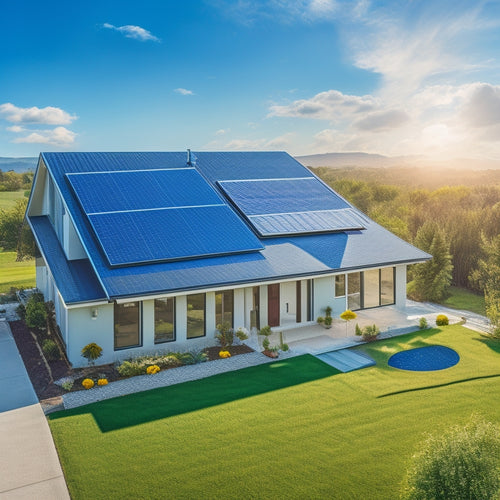
7 Essential Tips for Affordable Home Solar USA
Share
When considering affordable home solar in the USA, you'll want to follow these essential tips. First, assess your energy needs to determine the right system size. Choose the right panels for your climate and budget. Evaluate installation companies to guarantee a quality setup. Don't forget to understand incentives and rebates that can reduce your costs. Consider energy storage options to maximize your solar power. Select the ideal system size to meet your energy demands. Finally, monitor and maintain your system's performance to ensure peak energy production. By following these steps, you'll be well on your way to harnessing the power of solar energy - and there's more to explore to make the most of it.
Key Takeaways
• Assess energy needs and consumption patterns to determine the ideal system size for optimized energy production and cost savings.
• Evaluate installation companies based on credentials, experience, and quotes to ensure a quality and affordable installation.
• Explore financing options like solar loans or leases, and calculate the return on investment to find an affordable solution.
• Consider energy storage options and monitoring systems to enhance system performance and optimize energy usage.
• Research and understand federal, state, and local incentives and rebates to maximize savings and make solar energy more affordable.
Assessing Your Energy Needs
To determine the size and cost of a suitable solar panel system, you'll need to assess your energy needs by calculating your total daily energy usage in watt-hours (Wh). This involves evaluating your energy consumption patterns, taking into account factors like appliance efficiency, lighting, and heating/cooling systems.
Conducting an energy audit or home inspection can help identify areas of inefficiency and provide valuable insights for optimizing your energy usage.
An energy audit typically involves a thorough examination of your home's energy-using systems, including lighting, HVAC, and appliances. This helps identify opportunities for energy-saving upgrades and provides a detailed picture of your energy consumption.
A home inspection, on the other hand, focuses on identifying potential energy-wasting areas, such as air leaks, insulation gaps, and inefficient windows.
Choosing the Right Panels
As you explore your options for home solar, you'll find that choosing the right panels is essential.
You'll need to take into account factors like panel efficiency, which can greatly impact your system's overall performance.
When it comes to finding the best fit for your budget, you'll want to weigh the benefits of high-efficiency panels against more affordable alternatives.
Panel Efficiency Matters
You'll want to prioritize panel efficiency when selecting solar panels, since even a minor increase in efficiency can greatly impact your system's overall energy production. With so many options available, understanding what makes a panel efficient is crucial.
| Panel Type | Efficiency (%) | Price Range |
|---|---|---|
| Standard | 15-17 | $250-$350 |
| High-Efficiency | 18-20 | $350-$500 |
| Premium | 21-23 | $500-$700 |
When evaluating panel efficiency, consider the module quality and cooling systems. High-quality modules with advanced cooling systems can significantly enhance energy output. For example, panels with built-in cooling systems can reduce heat-related energy losses, resulting in higher efficiency. Additionally, look for panels with high-efficiency solar cells, which can convert more sunlight into electricity. By giving priority to panel efficiency, you can maximize your energy production and reduce your carbon footprint.
Budget-Friendly Options
With a vast array of solar panels on the market, finding budget-friendly options that meet your energy needs requires careful consideration of several key factors. You'll want to assess factors like panel efficiency, durability, and warranty periods to make sure you're getting the most bang for your buck.
Opting for lower-cost panels from reputable manufacturers can help reduce upfront costs. Additionally, considering DIY installation can greatly lower labor costs, but be sure you have the necessary expertise and follow safety guidelines.
Another important aspect is financing. You may want to explore low-cost financing options, such as property-assessed clean energy (PACE) financing or solar loans with competitive interest rates. These options can help spread the cost of installation over time, making solar energy more accessible.
When choosing a financing option, be sure to factor in the total cost of ownership, including interest rates and repayment terms. By carefully evaluating these factors, you can find a budget-friendly solar panel solution that meets your energy needs and fits your wallet.
Evaluating Installation Companies
When researching installation companies, you need to scrutinize their credentials, services, and customer reviews to guarantee a successful solar panel installation experience. A reputable contractor with a strong reputation is essential for a hassle-free installation process. Check if the company is licensed, insured, and certified by the North American Board of Certified Energy Practitioners (NABCEP).
A company's experience in the industry also matters; look for those with a proven track record of installations and a high customer satisfaction rate. Verify the company's physical address, phone number, and website to confirm they're a legitimate business. Be wary of companies with fake or rented addresses.
Check online review platforms like Yelp, Google, and Angie's List to gauge customer satisfaction. Pay attention to the overall rating, comments, and complaints. A reputable company should have a high rating and respond promptly to customer concerns.
Understanding Incentives and Rebates
As you explore the benefits of home solar, you'll want to understand the incentives and rebates that can greatly reduce the upfront cost.
You're eligible for a federal tax credit of up to 26% of your total installation cost, and you may also be able to take advantage of state and local incentives.
Federal Tax Credits
You can claim a federal tax credit of up to 26% of your total solar panel system cost, greatly reducing your tax liability and offsetting the upfront investment in your new solar energy system. This credit is a significant incentive for homeowners looking to switch to solar power.
When it comes to Tax Credit Limits, you can claim up to 26% of the total cost of your solar panel system, including installation and equipment costs. However, the credit amount is capped at $9,500 for residential solar installations.
To be eligible for the federal tax credit, you must meet certain Credit Eligibility Requirements. You must own the solar panel system, and it must be installed and operational by December 31st of the tax year. Additionally, the system must be located at your primary or secondary residence in the United States. You'll also need to have a tax liability sufficient to claim the credit.
State and Local
Beyond federal incentives, state and local governments offer additional rebates and incentives that can further reduce the upfront cost of your solar panel system. You'll want to explore these opportunities to maximize your savings.
Here are some examples of state and local incentives:
| State Incentive | Description |
|---|---|
| Net Metering Policies | Allows you to generate your own electricity and export excess to the grid, reducing your utility bills |
| Renewable Portfolio Standards | Requires utilities to generate a certain percentage of their electricity from renewable sources, creating demand for solar energy |
| State Tax Credits | Offers a state-level tax credit for solar panel systems, in addition to federal credits |
Keep in mind that these incentives vary by state and locality, so researching the specific programs available in your area is crucial. By combining federal, state, and local incentives, you can significantly lower the cost of your solar panel system and start generating clean energy for your home.
Selecting the Ideal System Size
Determining the ideal system size for your home solar installation involves calculating your energy needs and evaluating various factors that impact your energy consumption. You'll need to assess your energy usage patterns, the size and layout of your roof, and the amount of shade your roof receives.
To get an accurate estimate, you'll want to:
-
Review your past energy bills to determine your average daily energy usage
-
Evaluate the size and orientation of your roof to determine the available space for solar panels
-
Explore the energy output of different solar panel systems to find the one that best fits your needs
Considering Energy Storage Options
As you weigh the benefits of solar power, integrating energy storage options into your system can greatly enhance its overall performance and value. With energy storage, you can store excess energy generated during the day for use during the night or during outages, providing you with grid independence. This means you'll have power when you need it, even when the grid goes down.
When contemplating energy storage options, you'll want to think about battery maintenance. Proper upkeep is essential to guarantee your batteries last their full lifespan. This includes regular checks on battery health, updating software, and performing routine cleaning.
You'll also want to take into account the type of battery technology that best suits your needs. Lithium-ion batteries, for example, are popular for their high energy density and long lifespan.
Monitoring and Maintaining Performance
You'll need to monitor your system's performance closely to guarantee it's operating at its best, which involves tracking key metrics like energy production, consumption, and storage capacity. This secures you're maximizing your energy savings and identifying potential issues before they become major problems.
Regular system audits will help you stay on top of your system's performance, allowing you to make adjustments as needed.
To take your monitoring to the next level, consider the following:
-
Performance Analytics: Utilize advanced analytics tools to gain a deeper understanding of your system's performance and identify areas for improvement.
-
Real-time Monitoring: Keep a close eye on your system's performance in real-time, allowing you to quickly respond to any issues that may arise.
-
Customizable Alerts: Set up customizable alerts to notify you of any performance issues or anomalies, ensuring you're always in the know.
Frequently Asked Questions
Can I Install Solar Panels on a Rented Property?
You'll need to review your lease agreements to determine if installing solar panels is allowed, and understand your renter's rights regarding modifications to the property before pursuing solar installation on a rented property.
How Do Solar Panels Perform in Extreme Weather Conditions?
You're wondering if solar panels can withstand the fury of Mother Nature? Relax, they're built to brave the elements! They can handle snow loads of up to 5,400 pounds per square foot and are engineered to resist hurricane-force winds of 140 mph.
Are Solar Panels Compatible With All Roof Types?
You'll need to take into account solar panels compatible with most roof types, but you'll need to think about the roof material and insulation importance. For instance, asphalt shingles and metal roofs work well, while slate or clay tiles may require additional structural support.
Can I Add More Panels to My System in the Future?
As you navigate the uncharted terrain of renewable energy, you're not locked into your initial solar panel setup; you can chart a new course with system upgrades, seamlessly integrating additional panels for energy expansion, amplifying your power output.
Do Solar Panels Increase My Property's Value?
You'll be pleased to know that installing solar panels can boost your property's appraisal value, giving you a resale advantage, as they're viewed as a desirable, modern amenity that attracts potential buyers.
Related Posts
-

Why Choose Affordable Electric Scooters for Urban Commuting
By choosing an affordable electric scooter for urban commuting, you'll not only reduce your transportation costs by u...
-

Why Opt for These Affordable E-Scooter Alternatives?
You're tired of overspending on transportation and harming the environment, which is why you're considering affordabl...
-

5 Best Steps to Installing Solar Panels at Home
You're about to start on a journey to harness the power of solar energy at home. First, assess your home's solar pote...


